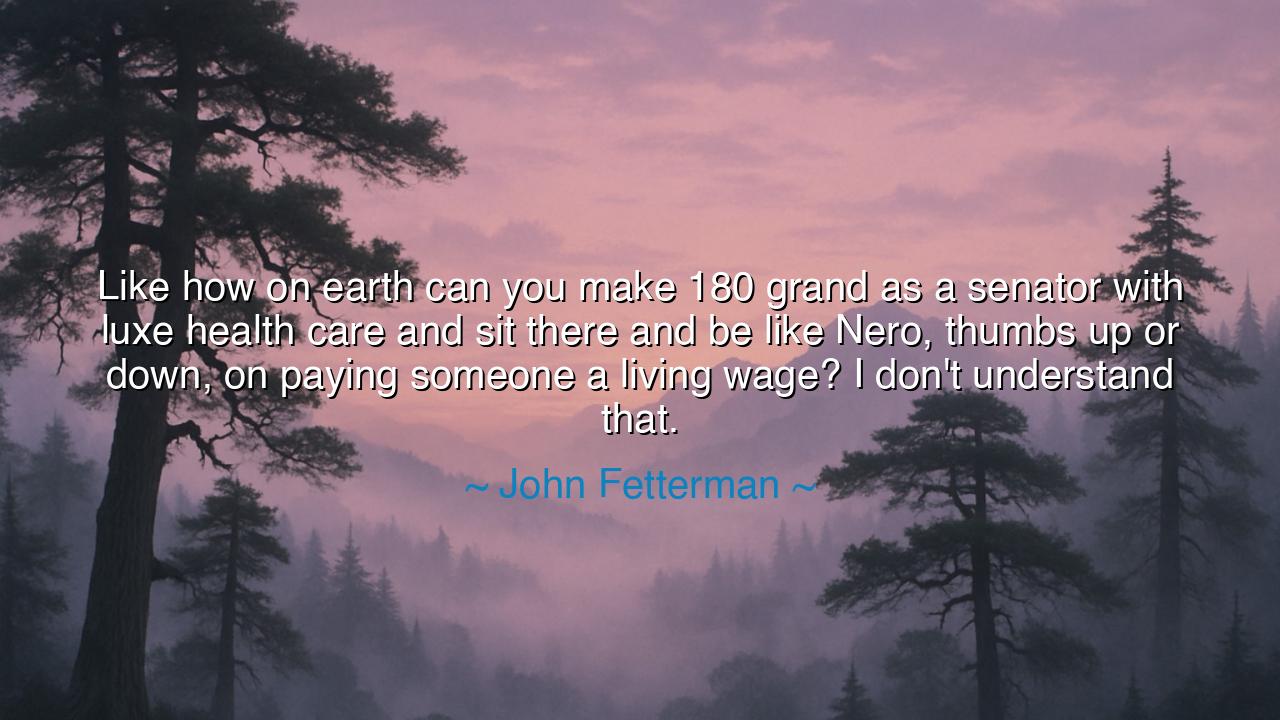
Like how on earth can you make 180 grand as a senator with luxe
Like how on earth can you make 180 grand as a senator with luxe health care and sit there and be like Nero, thumbs up or down, on paying someone a living wage? I don't understand that.






The bold and unyielding John Fetterman, a man known for his plain speech and unwavering conviction, once said: “Like how on earth can you make 180 grand as a senator with luxe health care and sit there and be like Nero, thumbs up or down, on paying someone a living wage? I don't understand that.” Though his words are clothed in the language of the present age, they strike with the force and clarity of ancient justice. His outrage is not born of envy but of moral clarity—for he calls out the hypocrisy of those who enjoy comfort while denying fairness to those who built the very world that sustains them. His question is not merely political; it is spiritual. How, he asks, can one dwell in abundance and look indifferently upon the suffering of others?
In the old world, there were kings who ruled by divine right, and emperors who wielded power like the sword of destiny. Yet even among them, the wise were those who saw leadership not as privilege but as burden. Fetterman’s comparison to Nero, the tyrant of Rome who watched his city burn while playing his lyre, is no idle insult—it is a moral allegory. Nero represents the ruler who has lost his soul, who measures life not in justice but in spectacle. To decide the fate of workers—whether they shall live in dignity or despair—with a careless gesture of approval or denial is to repeat Nero’s sin: to enjoy the luxury of power without the weight of responsibility.
The origin of Fetterman’s words lies in his life among the people. Unlike many in positions of power, he came not from palaces or privilege but from the working towns of Pennsylvania—communities that knew the sting of closed factories, low wages, and endless struggle. His outrage springs from witnessing firsthand the injustice of a system where those who toil the hardest often earn the least, while those who govern dwell in ease. When he speaks of a living wage, he speaks not in numbers but in morality—the belief that every human being, by virtue of their labor and existence, deserves the means to live with dignity, health, and hope.
History bears witness to this struggle. In the industrial age, when miners, steelworkers, and seamstresses labored long hours for meager pay, it was the few who dared to speak for the many that changed the course of nations. Consider Eugene V. Debs, who stood before the powerful and declared that “while there is a lower class, I am in it.” Or the reformers of the early labor movement, who faced prison and violence for demanding fair wages and humane hours. They, too, were condemned as radicals in their time, yet their courage lifted millions from misery. Fetterman’s spirit belongs to that same lineage—a lineage of those who refuse to accept that wealth alone should command the destinies of men and women.
But beyond policy and protest, Fetterman’s words speak to something eternal—the moral duty of empathy. He reminds us that wealth without compassion is decay, and power without conscience is tyranny. To sit in comfort and decide, like Nero, whether the poor may eat is to forget that leadership is not about privilege, but stewardship. Every society must ask itself: What kind of people do we become when we can watch others struggle to survive and feel nothing? The true test of a civilization is not how it treats its heroes or its rich, but how it treats its workers, its sick, its unseen.
There is a deeper irony in Fetterman’s lament. Those who sit in government halls with luxe health care—whose own well-being is secured by the labor of the people—owe their duty to those very citizens. To ignore their suffering is to betray the sacred bond of democracy itself. In this sense, Fetterman’s question pierces not only the conscience of senators, but of every citizen who has forgotten the weight of solidarity. For when the powerful forget compassion, and the comfortable forget gratitude, the fire of Nero’s Rome begins again—not in flames, but in the slow burning of human dignity.
The lesson, then, is both moral and urgent: justice cannot coexist with indifference. To live rightly in any age, one must see beyond one’s own comfort and recognize the humanity of others. Ask yourself, as Fetterman asks the leaders of his day: How can I enjoy what I have while my neighbor hungers? How can I be silent while others struggle for what is fair? Let empathy guide your choices, generosity temper your success, and truth shape your voice.
So remember, O seeker of wisdom: a just society does not thrive when the few live like emperors and the many struggle like slaves. True leadership is not luxury, but service; not detachment, but devotion. The living wage is not merely an economic policy—it is a moral covenant that declares every life worthy of dignity. Heed Fetterman’s cry, and never become like Nero, unmoved as others burn. For the strength of a people lies not in the comfort of its rulers, but in the compassion of its citizens—and it is compassion, not indifference, that keeps the fire of humanity from consuming itself.






AAdministratorAdministrator
Welcome, honored guests. Please leave a comment, we will respond soon